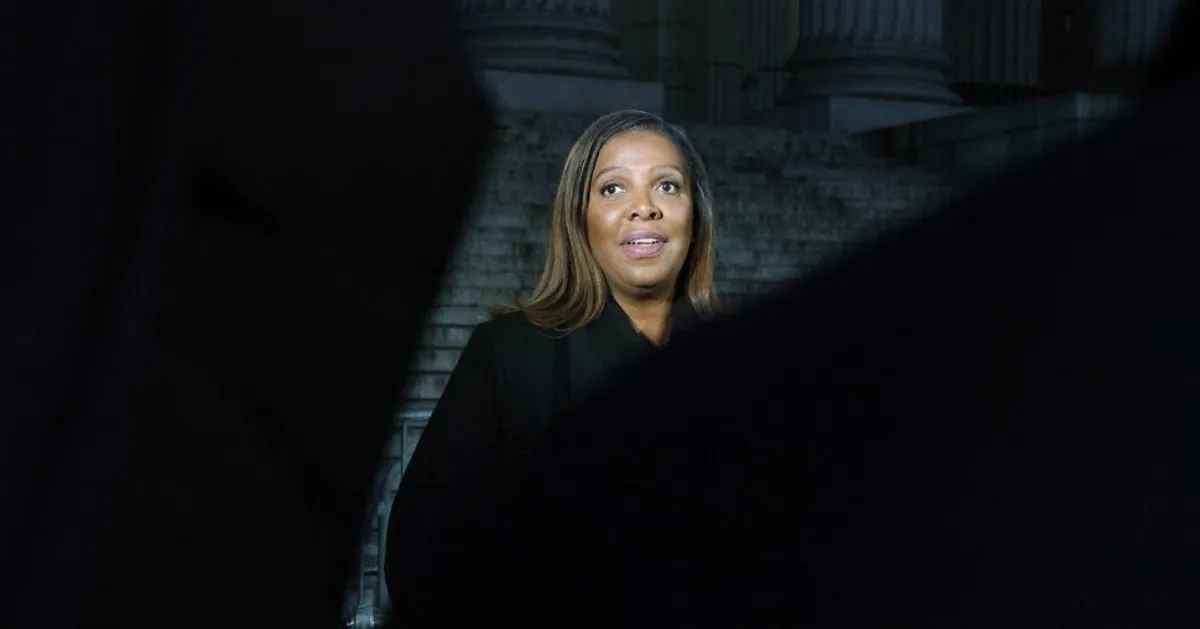
The recent indictment of New York Attorney General Letitia James by the Justice Department is a significant development that underscores a broader strategy of retribution associated with President Trump's anticipated second term. Over the summer, James's office received a criminal subpoena demanding extensive information about her long-term civil investigation into the former president. This month, a grand jury in Virginia issued charges against her, alleging bank fraud and false statements related to her mortgage documentation.
In the wake of these events, media outlets aligned with Trump have intensified their scrutiny of James, publicizing headlines that highlight her relatives' past criminal records. This barrage of negative publicity has served to amplify the perception of wrongdoing surrounding the Justice Department's actions. On Friday, James, who maintains that the allegations are baseless, will appear in a Virginia court, shifting from a plaintiff in her investigations to a defendant facing serious charges.
Trump's ongoing campaign against individuals he perceives as adversaries was once seen as a mere retaliatory measure. However, it is becoming increasingly evident that the construction of a narrative around criminality—including sensational headlines, intense scrutiny, and reputational harm—plays a crucial role in his strategy, often overshadowing the realistic prospects of conviction. The strain and expense associated with legal defense can significantly hinder opponents like James, who has been a prominent figure in a coalition of Democratic attorneys general that has launched approximately 40 lawsuits against Trump to safeguard their constituents' interests.
Moreover, the criminal investigation into James could jeopardize the consequences of the civil fraud lawsuit she filed against Trump. Although a nearly half-billion-dollar penalty imposed by a New York judge last year was recently overturned, other measures, such as an independent monitor overseeing the Trump Organization’s operations, remain in effect.
Barbara McQuade, a law professor at the University of Michigan and former U.S. attorney during the Obama administration, highlighted a concerning trend in contemporary legal proceedings. Traditionally, prosecutors are trained to treat those under investigation with respect, adhering to the fundamental principle that individuals are presumed innocent until proven guilty. McQuade expressed apprehension about the current environment where public figures, including the president, make sweeping statements about guilt prior to formal charges, turning the legal process on its head. She remarked, “It seems that humiliation is the goal instead of humiliation being a collateral consequence of a conviction. It’s the tail wagging the dog.”
In response to inquiries, a White House spokeswoman directed questions to the Justice Department, which opted not to comment on the ongoing situation. Notably, while the Trump administration has leveled accusations of mortgage fraud against various opponents, the indictment against James marks the first instance where such allegations have culminated in formal charges.
Charges involving home mortgages typically invite extensive public interest and scrutiny, often shedding light on the private lives of defendants long before any jury evaluation occurs. Such charges could serve as a potent weapon against any individual deemed a target by the administration. The intrigue and public examination that accompany criminal allegations are undeniable, yet historically, federal prosecutors have sought to mitigate such sensationalism.
Ed Martin, a Justice Department official advocating for James's prosecution, hinted at the impending charges via social media prior to the indictment, illustrating a calculated approach to public relations surrounding the case. Trump has reportedly expressed admiration for Martin, who has been vocal about the department's role in discrediting the administration's adversaries. Martin previously stated that regardless of the feasibility of charges, exposing "bad actors" would be a priority.
The ramifications of James's prosecution extend beyond her; they have also affected her family. Her great-niece, Nakia Thompson, who resides in the Virginia property under scrutiny, has a criminal record in both Virginia and North Carolina. Thompson's past, including her status as an absconder for failing to complete her probation for misdemeanor offenses, has been aggressively reported by right-wing media outlets. While James's alleged misuse of the property as a "rental investment" is central to the indictment, Thompson's testimony to a grand jury disputes these claims, stating she has not paid rent.
Legal experts, such as Elliott Jacobson, a former federal prosecutor, assert that cases hinging on the amendments to James's mortgage agreement may lack the necessary foundation for conviction. Jacobson suggests that her legal team could file a motion asserting that the evidence presented thus far is insufficient. However, it is essential to note that the prosecution has yet to disclose its evidence, complicating a comprehensive evaluation of the case's strength.
Beyond legal considerations, the personal dimension of James's prosecution aligns with the political battleground where Trump and his allies have thrived since the tabloids' golden era of the 1980s. In today's media landscape, distinguishing between objective legal analysis and politically charged commentary has become increasingly challenging. The resurfacing of past allegations against James's niece, although unrelated to the charges against her, could further tarnish James's reputation, especially among segments of the public less likely to engage with the intricate details of a $19,000 bank fraud case.
As one of Trump's initial targets for the politicized use of prosecutorial power, James embodies a longstanding adversary within the MAGA movement. Her commitment to investigating Trump during her campaign for attorney general has positioned her as a focal point in this ongoing conflict. In 2022, she filed a lawsuit against Trump, alleging that he had inflated his net worth by billions. Trump's unique history with the legal system has equipped him with a profound understanding of how the shadow of criminality can be wielded for political advantage.
Throughout his first term, Trump consistently expressed frustration over investigations into his conduct while advocating for inquiries into his opponents. Despite numerous scrutiny faced by his rivals, none have culminated in successful prosecutions, highlighting the complex interplay between legal actions and political theater in contemporary American governance.